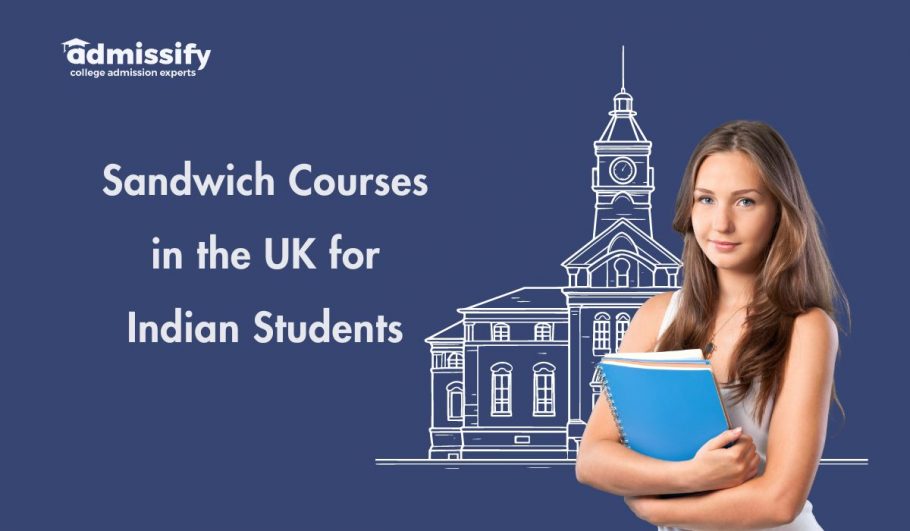Last Updated on November 4, 2024
As you are aware, a great number of students decide to study overseas, particularly in the UK, to improve their lives, obtain a top-notch education, and find long-term employment. However, not many people are aware of which study course to choose to facilitate their journey. Almost all universities in the UK provide excellent education. Fortunately, some provide study plans like sandwich courses to help students become ready for the workforce. What precisely is a sandwich course, then? How can it help you? To address your questions, we will discuss sandwich courses in the UK in this informative blog post.
What Are Sandwich Courses?
A sandwich course is a four- or five-year curriculum that combines a placement in a professional setting for a year, together with an undergraduate or postgraduate degree. In addition, it involves a period deferred from regular lectures for a placement, which may last for a full year or be a thin sandwich degree with several internships spaced throughout the course. Sandwich courses originated in the United Kingdom in the 1950s and are now popular around the world. For example, Canada’s sandwich degree is comparable to a co-op program. Cooperative (co-op) education is a program that allows you to gain industry experience relevant to your field of study.
Sandwich Course Versus Full-Time Course
A sandwich course in the UK distinguishes itself by including a year dedicated to work placement, typically extending the program to four years. This placement, lasting 9 to 12 months, provides students with valuable industry experience, enhancing their employability. Many UK universities mandate placements for specific subjects such as engineering, psychology, business, and design, making practical experience a crucial part of the degree.
What is a full-time course?
In contrast, a full-time course focuses on academic study without a mandatory placement year, usually allowing students to complete internships for up to 12 weeks. While these shorter internships offer some practical exposure, they do not match the depth of experience gained through a sandwich course.
The primary differences between the two lie in course duration and practical exposure. Sandwich courses are longer due to the integrated placement year and emphasise real-world experience, making students job-ready upon graduation. Full-time courses are shorter and more academically focused, without a dedicated year for work experience, although they may include shorter internships.
Overview
Students who prefer to complete their degrees without taking extended time off for work experience should consider a full-time course. Those seeking substantial industry experience as part of their education might find sandwich courses more beneficial.
Types Of Sandwich Programs In UK
In the UK, you can pursue one of two types of sandwich programs: thin or thick. We have two types to help you make an informed decision.
| Thick Sandwich | There are many different ways that you can use your internship: i) Becoming a professor or teacher is an option. ii) You may look into opportunities for industrial placement. iii) Any partner university allows you to study abroad. | |
| Course Structure | The majority of current courses follow a similar format. 1st and 2nd Year: University academic year3rd Year: Sandwich year4th Year: Academic year | This sandwich program contains a gap of two shorter periods. |
| Opportunities | Opportunities in a variety of fields are accessible, including business, sociology, engineering, geography, history, and forensics. | The main subjects in which these sandwich courses are available are sports studies, business, finance, psychology, and engineering. |
| Placement Options | There are many different ways that you can use your internship: i) Becoming a professor or teacher is an option. ii) You may look into opportunities for industrial placement. iii) Any partner university allows you to study abroad. | The courses aim toward experiential learning, and institutions provide possibilities for internships with businesses in the UK or throughout the world. |
What Is The Eligibility Criteria For Sandwich Degrees In The UK?
Sandwich Courses in the UK have similar eligibility criteria as other programs in the UK.
We have compiled a list of the main requirements for studying in the UK.
- Academic transcripts
- At least 60% from a reputable university.
- Statement of Purpose (SOP).
- Proof of English proficiency tests, such as the TOEFL/IELTS.
- GMAT and GRE scores for Master’s degrees.
- updated curriculum vitae
- Letter of recommendation (LOR)
What Are The Advantages of Pursuing Sandwich Courses In UK?
There are numerous ways in which a sandwich degree in the United Kingdom can help you advance your career.
- You manage your expenses while living abroad with the stipend provided by the internship.
- You will learn valuable skills that will help you advance in your career.
- Gaining insights into your preferred industry will allow you to stay ahead of your competitors.
- In most cases, if you establish a good working reputation, the internship organisation will extend you a pre-placement offer to work as a full-time employee after you graduate.
Top Universities For Sandwich Courses In UK
Sandwich courses in UK are offered at several universities across various disciplines. Here are UK universities that offer sandwich courses
| University | Course | Duration |
| The University of Sussex | Computer Science (MComp) | 5 years full-time with a sandwich year |
| Kingston University London | Aerospace Engineering (MEng) | 5 years full time including a sandwich year |
| The University of Greenwich | Business Logistics and Transport Management (BA Hons) | 5 years with a sandwich degree |
| Loughborough University | Bioengineering (BEng Hons) | 4 years full-time with placement year |
| Staffordshire University | Fashion (BA Hons) | 4 years with a 1-year placement |
| Middlesex University | Business Accounting (BSc Hons) | 4 years full-time with placement |
| Manchester Metropolitan University | Banking and Finance (BSc Hons) | 4 years with placement |
Furthermore, some courses, such as non-vocational sandwich degrees, which include an additional year of study abroad, allow students to learn a new language and gain cultural experience.
Conclusion
Work-study courses are four to five-year programs that include an undergraduate or postgraduate degree with a year-long professional placement. They originated in the UK in the 1950s. They offer a variety of opportunities in sports, business, finance and engineering. Eligibility criteria include academic transcripts, a minimum of 60% from a reputable university, and proof of English proficiency test. The benefits of the sandwich courses include managing costs, learning valuable skills and gaining industry insights.
FAQs
What are Sandwich Courses in the UK?
In the UK, Sandwich courses are four-year university programs that include a year of industry placement. This internship program typically takes place in the third year, providing students with valuable real-world experience and enhancing their employability.
Which Course is Best for Indian Students in the UK?
The best courses for Indian students in the UK include Engineering (Computer Science, Mechanical, Civil), Business and Management (MBA), Health Sciences (Medicine, Pharmacy), and Information Technology (Data Science, Cybersecurity).
Which Course is Best for Students in the UK?
The top courses for students in the UK are Medicine, Engineering (Mechanical, Electrical), Business and Finance (Accounting, Management), Creative Arts (Graphic Design), and Law.
What is the 4-Year Sandwich Course?
The four-year sandwich course in UK combines three years of university study and one year of internship. This format provides students with real-world industry experience, thereby enhancing their career prospects.

My primary goal is to provide a supportive and empowering environment where students can explore their thoughts, feelings, and concerns. I strive to help students develop self-awareness, resilience, and coping strategies to navigate the challenges of academic life, personal growth, and transitions. I aim to foster a sense of belonging and community, ensuring that students feel heard, valued, and understood. I utilize a variety of therapeutic techniques and approaches to meet students’ individual needs, empowering them to make positive changes, enhance their well-being, and achieve their personal and academic goals.




